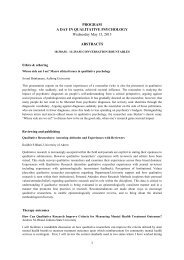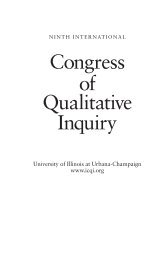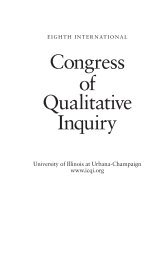Download QI2011 Preliminary Program - International Congress of ...
Download QI2011 Preliminary Program - International Congress of ...
Download QI2011 Preliminary Program - International Congress of ...
Create successful ePaper yourself
Turn your PDF publications into a flip-book with our unique Google optimized e-Paper software.
writing to achieve the shock on the readers and the communities in<br />
which they work.<br />
2 PM – 3:25 PM<br />
PANEL A: INCREASING COMPLEXITY IN QUALITATIVE<br />
RESEARCH IN PSYCHOLOGY<br />
“I like hearing about other people and I like thinking about it myself”:<br />
The Use <strong>of</strong> Groups in Qualitative Psychology Research<br />
Maya Lavie-Ajayi, Beng Gurion University <strong>of</strong> the Negev, Israel<br />
Much <strong>of</strong> contemporary research in psychology tends to suffer from over-<br />
individualistic approach. to move away from narrow perception <strong>of</strong><br />
human being without social, cultural and economic context we should<br />
consider all aspects <strong>of</strong> the research process: our research questions, the<br />
data we collect and our methodology. In this paper I will use examples<br />
from my own research to argue for the importance <strong>of</strong> using group<br />
interviews in qualitative psychology research. Group interview, as a<br />
research method, can support an exploration, by the researcher and<br />
the research participants, <strong>of</strong> people’s experiences within their social<br />
context. Bringing people together in research can create a sphere for<br />
participants to learn from each other. hearing others and being heard<br />
is <strong>of</strong>ten experienced as an empowering situation that develops one’s<br />
own understanding. It can highlight the similarities between experiences<br />
and by that highlight the social and even political aspect <strong>of</strong> the<br />
private experience.<br />
Memory and Interviewing in Narrative Research<br />
Marco Gemignani, Duquesne University, USA<br />
Challenging the assumption that, during interviews, memories are simply<br />
accessed, I first explore the practice <strong>of</strong> considering memory as an<br />
assumed cognitive function and then I highlight the social, cultural,<br />
and political location <strong>of</strong> memories. telling one’s past to an interviewer<br />
entails ongoing and parallel dialogues with processes <strong>of</strong> public<br />
remembrance and silencing. that is, the act <strong>of</strong> remembering entails a<br />
social contention between the remembered and the forgotten, which<br />
frequently develops along the lines <strong>of</strong> (re)membering. the exploration<br />
<strong>of</strong> the links among the remembered, the remember-able, memberships,<br />
and the forgotten/silenced is likely to inform the collection <strong>of</strong> data,<br />
both because they shape the contexts <strong>of</strong> the interview and because<br />
they inform the memories <strong>of</strong> the interviewees’ personal, social, and<br />
cultural identities.<br />
74 OFFICIAL PROGRAM Wednesday





